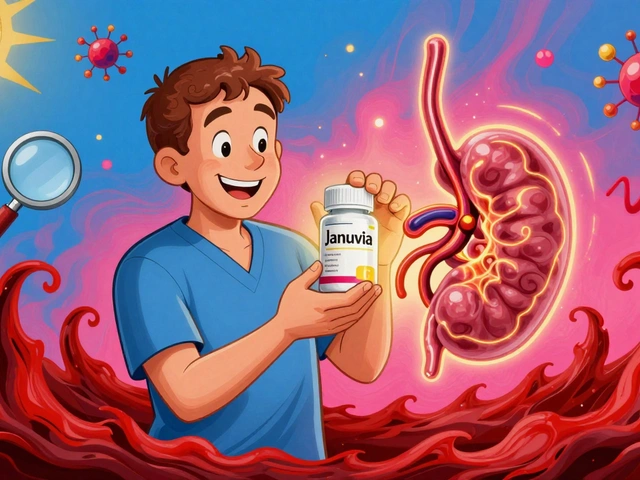Acid shooting up your throat? That burning in your chest after pizza night or a big coffee run isn’t all in your head. For millions, heartburn and acid reflux are a daily battle, and Protonix has become a go-to fix. But what’s really going on inside your body when you pop that little tablet? It’s not magic—just some very clever science that’s dialed right into the root cause. If you’ve ever wondered how it stacks up against competitors, what’s actually happening under the hood, and how to wring out every last bit of relief, this is what you’ve been looking for.
How Protonix Works: Not Just Another Heartburn Pill
Protonix is the brand name for pantoprazole, which belongs to a class of drugs known as proton pump inhibitors (PPIs). Let’s keep it simple: think of your stomach as a sort of acid factory. Normally, this acid breaks down food. But sometimes, your body gets a little overzealous and pumps out way too much—or lets it leak back the wrong way, up into your esophagus. That’s when the burn hits. Protonix jumps in and turns down the acid-making machinery itself.
Once you swallow Protonix, it cruises right through your gut, surviving stomach acid that would destroy most pills. When it reaches the special acid pumps in your stomach lining—the ‘proton pumps’—pantoprazole basically throws a wrench into their gears protonix latches onto them and blocks their ability to secrete more acid. Less acid, less pain. Instead of just putting a Band-Aid on the problem like antacids (which only neutralize acid that’s already there), Protonix fixes the source by turning off the tap.
This isn’t just about comfort: repeated acid exposure can lead to problems like erosive esophagitis or even increase throat cancer risk if ignored for years. That’s why long-term heartburn should never get shrugged off. Studies from the American Gastroenterological Association say PPIs like Protonix heal up to 85% of erosions in as little as eight weeks. That’s a serious win if your esophagus feels raw every time you eat salsa.
If you’re wondering how Protonix compares to others, it’s one of the most prescribed PPIs in the US, alongside omeprazole and esomeprazole. Its unique strength? It can be given by mouth or, in the hospital, through an IV—helpful for folks who can’t swallow or are recovering from stomach surgery.
Tips for Getting the Most Out of Protonix
A pill isn’t just a pill. How and when you take Protonix can make a huge difference. The standard advice is: take it about 30 to 60 minutes before your first meal of the day. Why? Stomach acid pumps really start revving up when you start eating, and you want the drug to be there first, ready to shut them down.
A quick breakfast and cold milk aren’t going to ruin things, but high-fat, heavy meals can keep your stomach working longer and may alter how fast the drug works. Don’t cut or crush the tablet, as the coating lets Protonix survive the acidic journey to your gut. If you absolutely can’t swallow pills, talk to your doc—they can sometimes give it as a liquid or IV.
Have complicated meds? Let’s be real, a lot of us do. Protonix can interact with some blood thinners, HIV meds, or antifungals by making the gut less acidic—changing how fast (or slow) the other drug is absorbed. For example, taking Protonix with warfarin may affect how your blood clots. Always make your full medication list known to your doctor.
If you need relief fast, Protonix isn’t instant like Tums or Pepto. PPIs usually take a day or so to really kick in—think of it as stopping heartburn at the source, not just patching leaks after the fact. Stick with it and don’t double up if you miss your dose. If you forget once, just take your next one on schedule.
Something people don’t always realize: using Protonix with healthier habits supercharges its effect. Simple tricks like raising your bed head six inches, swapping late-night snacks for earlier light meals, wearing looser clothes, and drinking less caffeine or alcohol give your stomach a break. Even chewing slower helps—less pressure, less regurgitation.

Real Risks and What to Watch Out For
Every med, no matter how common, comes with a flip side. Short-term Protonix use is usually easygoing—sometimes a mild headache or stomach gurgle. Rarely, folks might feel dizzy, develop diarrhea, or notice muscle cramps. That said, the major stuff pops up when people take PPIs for years on end rather than a few weeks or months.
Some studies have found that using high doses of PPIs over time can tinker with how your body absorbs nutrients. We’re talking vitamin B12, magnesium, and calcium. Here’s a weird fact: enough PPI over months or years could possibly thin your bones a bit, raising the risk of fractures—especially for older folks. There’s even some buzz about a slightly higher risk of gut infections like C. diff, thanks to less acid making it harder to kill off nasty bugs from food or water.
People with liver issues or kidney disease need extra care too. If you notice yellowing skin, big time fatigue, or weird swelling, check in with your provider. Protonix rarely causes severe allergic reactions, but if you ever get hives, swelling, or trouble breathing, don’t wait—get help immediately.
For parents: Protonix is sometimes used in kids, but only with doctor supervision. Dose is all about weight, and younger immune systems can react differently. Pregnant or breastfeeding? The safety data isn’t crystal clear, so weigh the pros and cons with your provider. The same goes if you’re trying to get off Protonix after long-term use. The acid pumps can rebound—meaning acid might come back even worse for a while, so a slow taper is often a smarter move than stopping cold turkey.
Want to know how common side effects really are? Take a look at this quick data overview:
| Side Effect | Short-Term (Less than 1 month) | Long-Term (6+ months) |
|---|---|---|
| Headache | 13% | 11% |
| Diarrhea | 6% | 8% |
| Low magnesium | <1% | 5% |
| Bone fracture | <0.1% | 2.5% |
| Vitamin B12 deficiency | <1% | 3% |
Remember, not everyone gets these problems, but paying attention means fewer surprises down the line.
Makes Life Simpler—If You Use It Right
The number one thing Protonix users want is to get back to eating and sleeping without dreading heartburn. It’s safe for most, but not built for instant gratification or casual use like an over-the-counter antacid. For those stuck with chronic acid reflux, peptic ulcers, or severe gastritis, it actually lets your esophagus heal up and helps your guts tolerate life’s little (or big) indulgences.
Some practical life tricks if you’re in the Protonix club:
- Avoid lying flat immediately after eating—try to wait at least two hours.
- Don’t mix Protonix with grapefruit juice; it can mess with absorption.
- For night-time heartburn, a dose before dinner usually works better for chronic reflux than when taken with breakfast—ask if you should switch times.
- If you suddenly feel worse after starting Protonix—especially if you start vomiting blood or notice black, tarry stools (signs of internal bleeding)—that’s a sign to call for help immediately.
- People using Protonix for ulcers related to NSAIDs (painkiller use) usually need follow-up check-ins, since the root cause (ibuprofen/aspirin) might still be there.
Protonix doesn’t play well with every lifestyle. It works best when you aren’t skipping meals, downing coffee on an empty stomach, or shoveling late-night fast food. If you travel a lot across time zones, build reminders to help you keep your dosing steady. Sticking to regular mealtimes makes a world of difference in how it works for you.
And here’s a key step people miss: regular check-ins. Even if it feels like it’s working, a doctor might want occasional labs to check electrolytes or vitamin B12 if you’ve been on it more than a year. For people at risk for bone loss, a DEXA scan makes sure you’re not quietly thinning your skeleton without knowing. Better to know and have the chance to add in a supplement or switch meds instead of guessing.
So, can Protonix fix your gut for good? Nothing permanent—once you stop, the acid pumps eventually recover. But if it gives you back your mornings, saves your sleep, or lets you finish taco night without acid regret, that’s a pretty solid deal. Just don’t go it alone—ask questions, look for patterns in your symptoms, and never be afraid to double-check what you read online, even from a Charleston guy who’s been there and done that.








June 15, 2025 AT 02:57
California Daughter
I swear this whole PPI thing is a scam. I stopped taking mine and my heartburn got better. Turns out I was just eating too much pizza and lying down after. No drug needed. 🤷♀️
June 15, 2025 AT 06:36
Shanna Talley
Honestly this is one of the clearest explanations I've read. So many people panic about meds but when you understand how your body actually works it's way less scary. Small changes + smart use = real relief. You got this 💪
June 16, 2025 AT 04:29
ridar aeen
I don't get why people act like PPIs are the devil. My doc told me to take it for 8 weeks and my esophagus went from raw to fine. If you're gonna rage against the machine at least know what you're raging about.
June 17, 2025 AT 17:05
chantall meyer
I find it fascinating how Americans treat pharmaceuticals like spiritual remedies. In South Africa we'd rather chew ginger and pray. But I suppose if you've got insurance and a doctor who nods along... why not?
June 19, 2025 AT 06:10
Will RD
PPIs are fine but dont forget your body makes acid for a reason. I stopped mine and started eating smaller meals. No more burn. No more pills. Just common sense
June 19, 2025 AT 10:28
Ganesh Kamble
This article is just pharma marketing dressed up as science. PPIs cause more problems than they solve. Why do you think they're sold like candy? Because they make people dependent. Duh.
June 20, 2025 AT 19:20
Theresa Ordonda
I’ve been on Protonix for 3 years. Lost my B12. Got a weird nerve tingling. Then I switched to H2 blockers. Life changed. 🙏 Also stop drinking wine before bed. Just sayin’ 🍷❌
June 21, 2025 AT 02:48
Judy Schumacher
The notion that one can simply 'take a pill' to circumvent the biological consequences of chronic dietary negligence is not merely irresponsible-it is a profound epistemological failure of modern medicine. One must ask: Who benefits?
June 22, 2025 AT 09:25
Megan Raines
So... you're telling me I can't just eat a burrito at 2am and then pop a pill like it's a candy? Wow. Mind blown. 🤔
June 22, 2025 AT 14:24
Mamadou Seck
I took this for a month and my stomach felt like a ghost town. No acid no burn no nothing. Then I stopped and ate tacos and boom back again. So yeah it works but its not magic
June 23, 2025 AT 14:40
Anthony Griek
In my family we've always used turmeric and chamomile tea. But I get it-some folks need the science. This post does a good job explaining how it works without scaremongering. Respect.
June 23, 2025 AT 21:51
Norman Rexford
PPIs are fine for the weak. Real Americans eat spicy food and fight the burn. I've never taken one and I'm 67. My dad never took one and he lived to 92. This country is too soft
June 24, 2025 AT 07:27
Wayne Keller
If you're on this for more than 6 months, talk to your doctor about labs. Seriously. It's not scary-it's just smart. Get your B12 and magnesium checked. You'll thank yourself later.
June 24, 2025 AT 12:05
Shana Labed
OMG YES. I was on Protonix for 2 years and my doctor never mentioned B12. I was so tired all the time. Got tested-B12 was 180. Started supplements and I feel like a new person. This is life-changing info. THANK YOU
June 24, 2025 AT 12:07
Vishwajeet Gade
This is why India has better gut health. We eat fermented foods. We don't need pills. You Americans are addicted to quick fixes. Just eat less junk.
June 24, 2025 AT 20:59
Casey Crowell
I was skeptical too until I tried it. Took me 3 days to feel better but now I can sleep without a pillow wedge. Life changer. Also-raise your bed. It’s not a joke. 🛏️